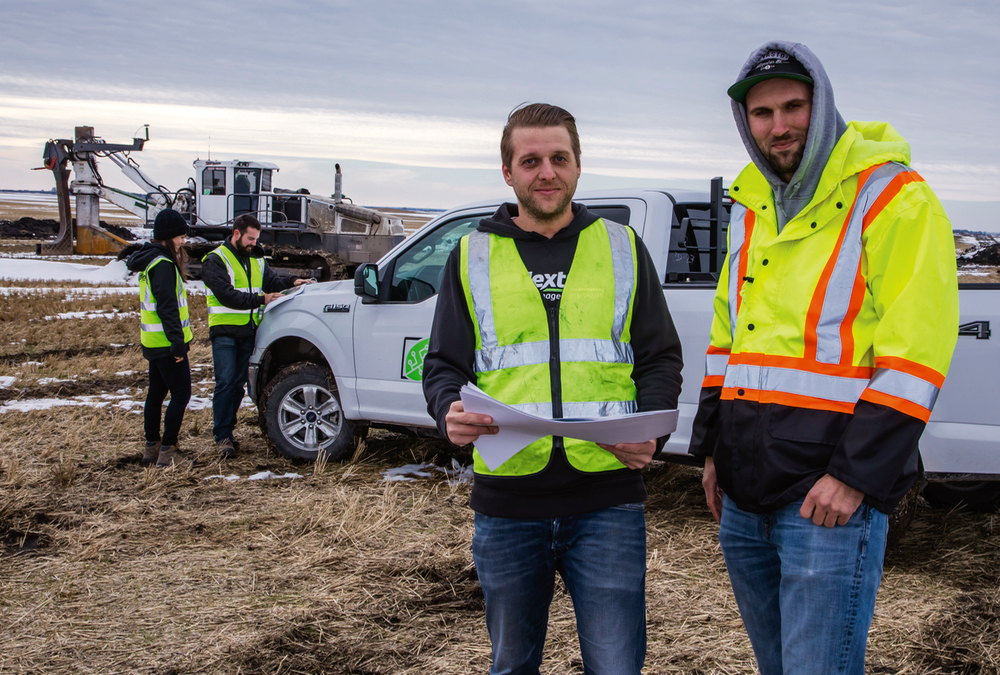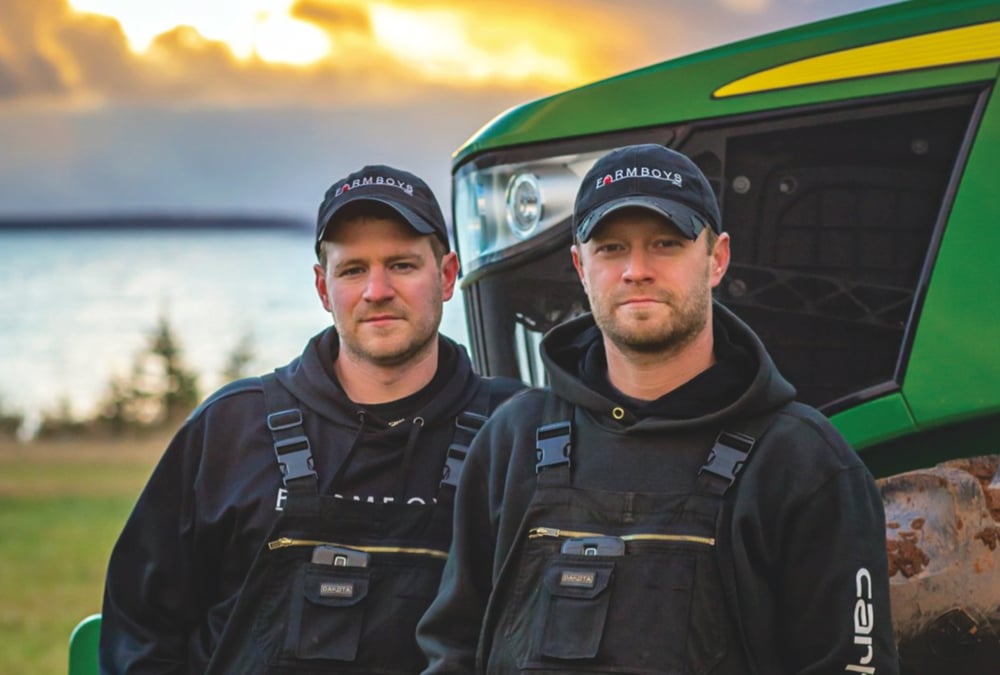Something big jumps out at you when you scan the Growth 500 list of Canada’s fastest growing companies for 2019. It’s produced by Canadian Business magazine based on the five-year revenue growth posted by each company, and tucked in amongst all the names of all the non-agricultural, big-city enterprises on the list, is one very notable exception.
NextGen Drainage Solutions is a tile drainage installation company in the tiny village of Pilot Mound, population 700, a couple of hours southwest of Winnipeg.
And it didn’t just scrape its way onto the list of the country’s most successful and fastest-growing ventures.
It’s 77th, based on its 1,265 per cent growth in the last five years.
Not bad, you have to say, for a company run by someone who hadn’t even reached his 30th birthday five years ago, and was just beginning to farm.

So here’s some more background on Brett Sheffield, now 34 and president and CEO of the company. In 2008 he had just returned from a stint working in Australia and joined his father, Lyn, on the family’s then 800-acre farm. Sheffield rented some land and decided his future was in agriculture, so returned to the University of Manitoba to earn his ag diploma. While still in school, he purchased and rented more land to grow the farm to 4,000 acres.
Along the way, Sheffield was picked to go to New York in 2012 to enter the Global Student Entrepreneurship Award (GSEAO ) competition. He’d got that honour by placing first in Canada as a student entrepreneur in Advancing Canadian Entrepreneurship — a competition run by Enactus, an organization he’d linked up with while at the U of M. And he returned from the Big Apple having scored second place in the international.
Read Also

‘No agenda, no attenda’: How to professionalize your family farm meetings
Establishing meeting ground rules can help a farm family find ways to communicate that work for the business and the family.
Back home, though, he faced the same challenge as many beginning farmers.
How was he going to add enough income potential to the family farm to sustain an extra generation?
Obvious solutions like acquiring more land were out of the question, given the rising price of farmland, so Sheffield got keen on finding ways to make their relatively few acres of cropland more productive.
It’s still a leap to NextGen Drainage Solutions, of course, but you can see that he was hungry for an idea. He just needed to find it.
Sheffield had studied tile drainage at university and knew it can provide very real benefits for farmers, from improving the physical properties of the soil to maximizing the return on equipment and labour.
It looked like the right investment, and Sheffield decided to tile one of the family’s fields. That field went from unproductive to one of their most profitable overnight, and it got him thinking about drainage as a potential boon for other farmers, too.
“As soon as we saw that this was a product that could completely change everything on our farm… I just thought, what a great opportunity to use this, and take this to the market in Manitoba and Saskatchewan.”
A technology difference
By then, girlfriend Jen Avery, (the couple married this past June) was in the picture too, and the two of them began to think how they could take their idea and make it even bigger.
They saw a company that would take tile drainage to the next level, developing custom systems for their farm customers by specializing in state-of-the-art tile and water management technologies and the latest in agronomic knowledge.
That combination of agronomics and technology proved right. Today, NextGen Drainage Solutions has a staff of 20 and has tiled approximately 30,000 acres of farmland, making it one of the largest tile contractors in Western Canada, with projects ranging from 20 to over 1,000 acres and farm customers across Manitoba, Saskatchewan and Alberta.
The company’s slate of professionals, from those who do the field work installing the tile, plus its survey and operations managers, permit manager, design engineers and administration, now enable NextGen to offer a full-service package to farmers, ensuring their projects are the right fit for the farm and also get approval in the watersheds where they’re implemented.
“We work with people to help survey, design and permit tile drainage and surface drainage,” Sheffield explains.
NextGen Drainage Solutions has also recently teamed up with Farmers Edge, a leading Canadian company with a world-class team of farm data scientists, to give farmers access to a complete package of advanced tile drainage technology.
Customers are offered maps with satellite imagery to identify their fields’ problem areas, along with soil tests to determine field hydro-conductivity. Then they are provided custom tile solutions.
Additional data gives customers key information on field temperature and moisture for making informed field management decisions.
Important as it is, though, Sheffield is the first to say that technology is only part of what has driven NextGen’s growth. He also attributes that growth to a business culture that treats their relationship to each and every customer as a commitment.
It may sound like the sort of thing any company would say, but when you see such prolonged and consistent growth, you get the sense that they’re doing it right.
“We really care about quality and we really care about customer service,” Sheffield says. “Coming from an agricultural background we truly understand what we’re doing, and as a farmer myself, we know what we would want on our land for land improvement. We make sure we’re passing all of that on to our customers.”
Right from the start
Sheffield didn’t jump into this by any stretch. Instead, he made a considerable investment in his own learning, studying tile drainage and sub-surface irrigation both at the University of Guelph and at Ohio State University.
He also made a point of learning from others through a very deliberate pursuit of mentorship as he prepped for the startup. Major influences were large tile contractors he connected with in the U.S.
“They taught me the importance of installing tile correctly and all the issues that may come up in different soils and situations. This was a huge help to me since tile is a long-term investment, with systems lasting over 50 years after installation.”

He’s also sought out executive managers of other companies in Canada and Australia, seeking guidance for best practices in management and maximizing operations.
Those mentors, not surprisingly, reinforced the value of seeking advice, he says, although he believes it was in college where he really learned how much value there is in asking others for help.
“I think it was my ag diploma program that really showed me the importance of communicating with others, just to find out what everyone was doing, with leaders in their own industry, and to be able to talk and see what was working and what wasn’t working, and finding people who’ve skinned their knees first,” he says.
“Rather than making mistakes, I wanted to work together to find out some lessons learned, from a farmers’ perspective, and contractors’ perspectives,” Sheffield says.
What was the most important thing he learned? Not surprisingly it can be hard to narrow it down, but he says that if he could summarize the advice he was given, it would be about prioritizing quality and thoroughness over quantity and speed, and to do it in all the services and products you provide.
“Basically it was, take your time and do good quality work,” Sheffield says. “The numbers will come later.”
The right time
The timing of the startup was a key to both its launch and growth, he says. It was the rising value of farmland that made it possible for him to secure a loan from some of the land he’d purchased to buy his first tile plow and help self-finance his business startup.
At the same time, those high land prices also pushed other farmers to look for ways to boost their productivity without having to expand their landbase.
“It really was catching on for potato growers at that point,” Sheffield says. “Land had jumped from $1,000 up to $3,000 an acre in our area around 2012, and since then it’s grown even more.”
Having a staff with agricultural backgrounds has been a key asset for the company as it has grown, he continues. “We have a fantastic team and we truly understand what we’re doing,” Sheffield says. “And as a farmer myself, we know what we would want on our land for land improvement.”
“We,” of course, means the professionals that today deliver the product and services of NextGen Drainage Solutions. He’s very proud of that team.
“There’s been learning experiences on what type of team works best for us, but we found a group of like-minded people that put quality first, that have an agricultural background and understand the people we’re working with.
“Each one of us has something that we specialize in so that just makes us stronger as a whole,” Sheffield says.
A local solution
Sheffield is equally proud of where NextGen Drainage staff are from, i.e. the farms and the small town of Pilot Mound and others in the region.
Hiring locally and creating good jobs locally has been a critically important aspect of this business to him, he says.
“The big thing is we want to bring jobs to rural Manitoba,” Sheffield says. And good jobs. Theirs is a business paying very good wages and offering year-round employment. The majority of their staff have received education and training, with most now qualified as advanced tile drainage installers through the University of Guelph. That’s created a company that not only knows what it’s doing and producing quality work, he says, but one that’s contributing to rural prosperity.
It also intersects with his belief in the small community of Pilot Mound, he says. All his life he’s been part of a town driven by volunteerism.
“It’s more about building something than just looking after our bottom line,” Sheffield says.
That’s also why he submitted his company’s financials for ranking on Growth 500 too; agribusiness has an important story to tell about the prosperity, opportunities and jobs it’s creating in rural Canada — and this was an opportunity to tell it.
“I thought this would show that there’s opportunities in small communities.”
Non-farm investments
That concept extends to a couple of businesses Sheffield and his wife Jen have invested in locally.
One is a small private gymnasium, the Stay Fit Health Club. It’s a co-ed fitness facility in Pilot Mound. That was a small business they acquired several years ago mainly in order to keep the lights on in an important recreational asset in their small town. These are the kinds of services that help make small town life attractive and it was a good early business opportunity, Sheffield says.
“Interestingly enough, it was my ag diploma program showing me my return on investment for equipment that kind of let me take a look at different opportunities in a small community. In a small community it might not be huge returns but it is important for us to have these businesses and offer these services in small towns, so that there’s a good quality of life.”
Likewise, it was their goal of helping boost opportunities for others in business that prompted him to purchase a commercial building in Pilot Mound that houses a dozen businesses. It had been previously operated by a group of local shareholders and housed small businesses. It had been built in the 1980s to serve as a base for attracting a doctor and financial services to the community.
Knowing it was up for sale, Sheffield says they did not want to see it being acquired by someone who’d raise rents and potentially make occupancy prohibitive.
“All we wanted to do was offer low rent, at the current rates that Fraser Development Corporation has been doing so that we could allow small businesses to come into our community and thrive.”
Farmers Edge is one of the dozen tenants now housed in the building that also includes the provincial agriculture office, a law firm, an accountant’s office, plus a variety of health and wellness services including physio and massage therapy, a hairdresser and, fittingly, the office of the local community economic development officer.
“It’s a great place for people to come in, and it’s low risk, on a month-to-month. It’s really for anyone who is wanting to pursue their own business.”
“I’ve invested in Pilot Mound because I truly believe in this little community and I want to offer something here.”
Therein lies the real Sheffield — a hardworking, early-rising, uber-focused, big-picture thinking farm guy who likes to think about that saying “a rising tide raises all boats.”
Sheffield isn’t convinced he’s that rare, either. There’re plenty more farmers and agribusiness owners seizing and creating opportunities, he says, and he forecasts there’s a lot more non-farm investment on the horizon, too, as farmers apply their business smarts in other areas.
“I think we’re going to see a lot more of this,” Sheffield says. “There is so much opportunity and there are so many talented individuals in agriculture, and farmers that are just getting this business sense… We have so many smart incredible people out there farming today.”















